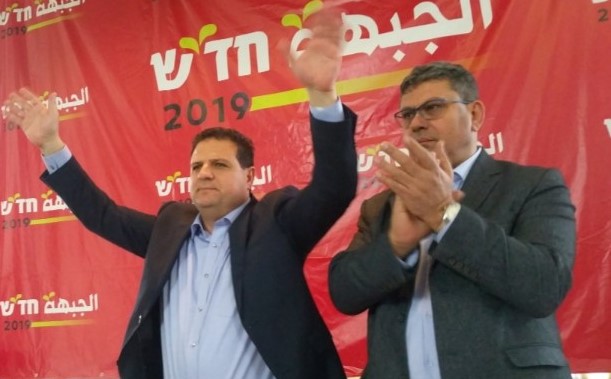Hadash (The Democratic Front for Peace and Equality – Communist Party of Israel) and three political parties representing the Arab-Palestinian national minority in Israel, Ta’al, Ra’am and Balad, have announced they will reunite for the upcoming Knesset elections.

Hadash MK Ayman Odeh and Secretary General of the Communist Party of Israel, Adel Amer, during a meeting in Haifa (Footage: Hadash Facebook)
The four parties first united in the run for the 20th Knesset in 2015, in the wake of legislation initiated by the far-right to raise the electoral threshold for entering the Knesset to 3.25% (a minimum of 4 seats), which was aimed precisely against Arab representation in the Knesset, forming the Joint List which won 13 seats in the 120-member parliament to become the third largest political bloc.
After their disappointing showing in the April elections, when the four parties, running in two blocs, won a combined 10 seats, the current move to reunite as in 2015 is designed to boost voter turnout and improve representation for the Arab minority and progressive Jewish forces in Israel’s parliament. The country is heading for its second general elections this year on September 17, after far-right Prime Minister Benjamin Netanyahu failed to form a majority coalition government following the April vote.
Hadash MK Ayman Odeh, the group’s prospective leader, said Thursday, June 20, that it had been a mistake to run separately. Odeh said after the decision was announced: “Our forces are unified, we have similar pasts, similar visions for our future, and from today, a joint list. We will fight for Arab rights in the country, peace, and democracy for all the citizens of Israel.” The Communist daily newspaper Al Ittihad reported that a joint forum would meet in the coming days to decide the final make-up of the slate.
The parties said that a joint list was no less important today than it was in 2015, especially in light of last year’s passage of the “racist, colonial Nation-State Law and its consequences; discriminatory policies; the siege (on Gaza); confiscation of Arab-owned lands; the dearth of available housing in the Arab community; the establishment’s effort to strip our citizenship of all meaning; and our will to battle increased crime and violence in our communities.”
The statement released collectively by the four parties said that the results of the last elections – in which they lost three seats – were a “severe blow to the political effort” in the Arab community. As such, drawing conclusions and learning lessons was crucial.
The statement added: “To that end, there are new challenges on the diplomatic level, especially in wake of efforts by the US administration to implement the ‘Deal of the Century’ by recognizing Jerusalem as Israel’s capital and moving the US Embassy there, by recognizing the annexation of the Golan Heights; the attacks on UNRWA (the UN organization for Palestinian refugees whose budget has been cut by the U.S.); and the worrying ‘regional conversations’ taking place, such as the upcoming conference set to be held in Manama, the capital of Bahrain.”
Related:


